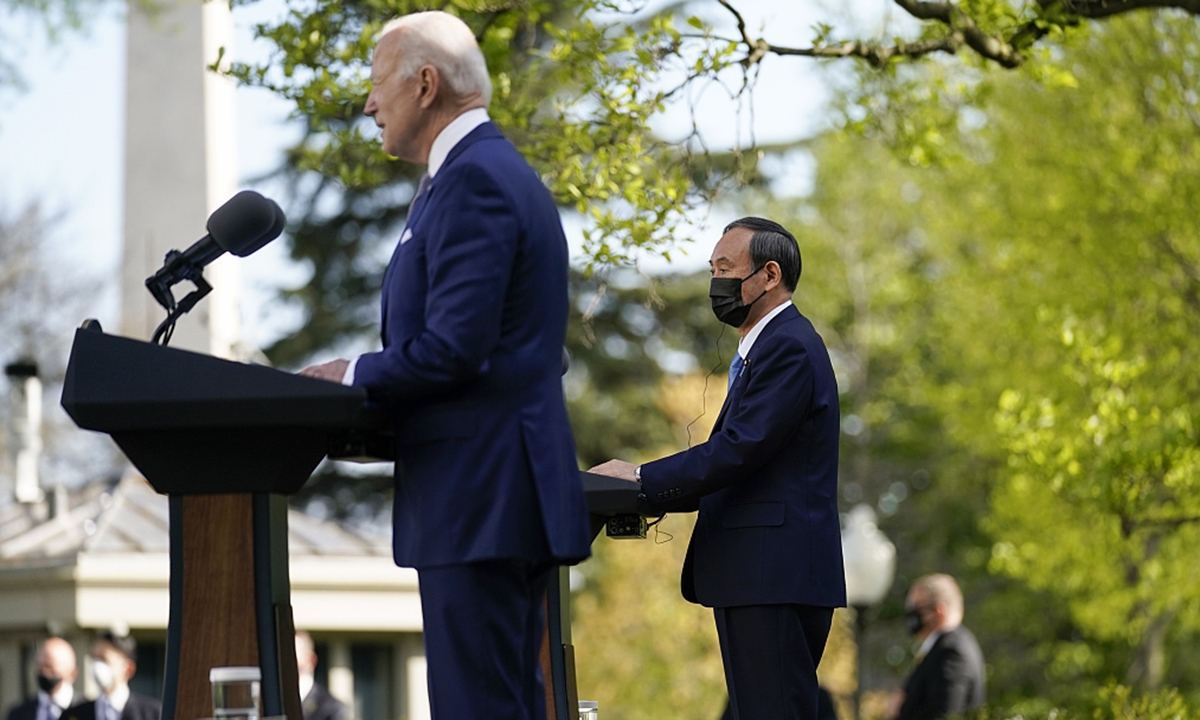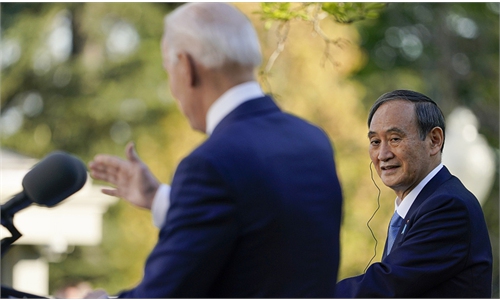Stance on Taiwan shows lopsided Japan-US ties

Photo;VCG
The "importance of peace and stability in the Taiwan Strait" - US President Joe Biden and Japanese Prime Minister Yoshihide Suga mentioned the Taiwan question in their joint statement for the first time since 1969 when American and Japanese top leaders did so in their joint statement.In addition to mentioning the Taiwan question, the two sides also emphasized the importance of the US-Japan alliance. They accused China of conducting "economic and other forms of coercion" in the Indo-Pacific region.
Although the US and Japan did not directly make security commitments to Taiwan in their statement this time, Washington and its Indo-Pacific allies have started to comprehensively re-examine their relations with China. Mentioning the Taiwan question after 52 years shows that Tokyo is adjusting its China policy. This is not beyond people's expectations. When talking about the Taiwan question, the US was always mentioned. But in fact, Japan has made many small tricks in its Taiwan policy in recent years. The ruling Democratic Progressive Party of the island of Taiwan has moved closer to Japan as well.
However, the Taiwan question is Beijing's red line. China opposes any country's developing official relations with Taiwan. But the US has increasingly shown such a trend in recent years, using "salami-slicing" tactics to hollow out its one-China position. And Japan has been following the US step by step.
In the US-Japan joint statement in 1969, Japan said the maintenance of peace and security in the "Taiwan area" was important for its own security. During that time, the Chinese mainland did not establish diplomatic relations with either the US or Japan. And Japan did not have such a close tie with Taiwan as well. At that time, the US-Japan alliance was constantly strengthening and Japan basically did not have much choice and autonomy. All it could do was to closely follow the US' steps. But now, Japan has more considerations and calculations of interests of its own.
At that time, China was relatively weak. But now, China has already become a country with the strongest political, economic and military power in the Asia-Pacific region. China's national strength is now way ahead of Japan. Indeed, Japan feels uncomfortable about this, and it is now willing to follow the US' suit on the questions of South China Sea, the Diaoyu Islands and the Taiwan Straits. In fact, Japan has already taken sides. Standing with the US to contain China is in line with Japan's own judgment of its national interests.
Washington and Tokyo have emphasized that jointly coping with the risks brought by China and have strengthened their alliance with their shared values. The two countries are tearing the Indo-Pacific region apart. The US-Japan alliance is a product of the Cold War. Forming small circles is actually deviating from the trend of historical development. Issuing a statement against a third country and targeting China's rise does not contribute to regional security and stability.
To maintain its hegemony, the US has acted against rules to hinder China's development. Japan, meanwhile, is turning itself into an Asian accomplice of the US policy. Tokyo did not hesitate to betray the interests of the entire region, binding itself to Washington. And it is not surprising that Suga made such a decision. On the one hand, this is Suga's attempt to save his approval rate. On the other hand, Japan increasingly believes that its major threat comes from China, and it will further turn to the US.
Even after a new Japanese prime minister is elected, Japan will not necessarily reverse such a decision. In the long run, Japan may believe its strategic interests are closer to that of the US and containing China may seem more beneficial for Japan. Japan may only try to maintain a balance between China and the US when it is forced to do so. China and Japan are neighbors, but the closer they are, the more fear Japan seems to have - because it has basically lost the ability to compete with or confront China.
The author is deputy director and senior fellow of the Institute of American Studies at the Chinese Academy of Social Sciences. opinion@globaltimes.com.cn



